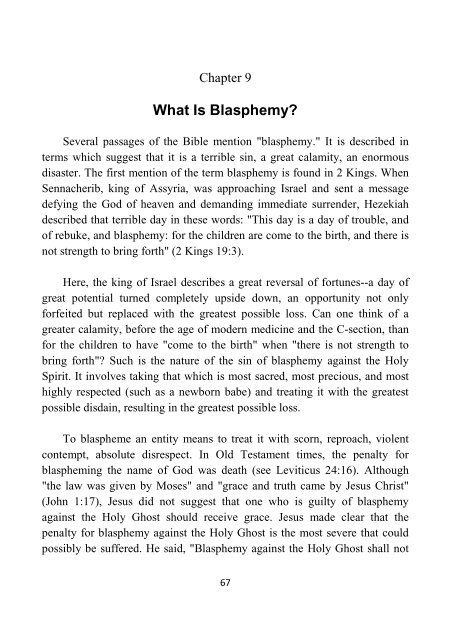Message of the Latter Rain - Kelvin M. Duncan
Create successful ePaper yourself
Turn your PDF publications into a flip-book with our unique Google optimized e-Paper software.
Chapter 9<br />
What Is Blasphemy?<br />
Several passages <strong>of</strong> <strong>the</strong> Bible mention "blasphemy." It is described in<br />
terms which suggest that it is a terrible sin, a great calamity, an enormous<br />
disaster. The first mention <strong>of</strong> <strong>the</strong> term blasphemy is found in 2 Kings. When<br />
Sennacherib, king <strong>of</strong> Assyria, was approaching Israel and sent a message<br />
defying <strong>the</strong> God <strong>of</strong> heaven and demanding immediate surrender, Hezekiah<br />
described that terrible day in <strong>the</strong>se words: "This day is a day <strong>of</strong> trouble, and<br />
<strong>of</strong> rebuke, and blasphemy: for <strong>the</strong> children are come to <strong>the</strong> birth, and <strong>the</strong>re is<br />
not strength to bring forth" (2 Kings 19:3).<br />
Here, <strong>the</strong> king <strong>of</strong> Israel describes a great reversal <strong>of</strong> fortunes--a day <strong>of</strong><br />
great potential turned completely upside down, an opportunity not only<br />
forfeited but replaced with <strong>the</strong> greatest possible loss. Can one think <strong>of</strong> a<br />
greater calamity, before <strong>the</strong> age <strong>of</strong> modern medicine and <strong>the</strong> C-section, than<br />
for <strong>the</strong> children to have "come to <strong>the</strong> birth" when "<strong>the</strong>re is not strength to<br />
bring forth"? Such is <strong>the</strong> nature <strong>of</strong> <strong>the</strong> sin <strong>of</strong> blasphemy against <strong>the</strong> Holy<br />
Spirit. It involves taking that which is most sacred, most precious, and most<br />
highly respected (such as a newborn babe) and treating it with <strong>the</strong> greatest<br />
possible disdain, resulting in <strong>the</strong> greatest possible loss.<br />
To blaspheme an entity means to treat it with scorn, reproach, violent<br />
contempt, absolute disrespect. In Old Testament times, <strong>the</strong> penalty for<br />
blaspheming <strong>the</strong> name <strong>of</strong> God was death (see Leviticus 24:16). Although<br />
"<strong>the</strong> law was given by Moses" and "grace and truth came by Jesus Christ"<br />
(John 1:17), Jesus did not suggest that one who is guilty <strong>of</strong> blasphemy<br />
against <strong>the</strong> Holy Ghost should receive grace. Jesus made clear that <strong>the</strong><br />
penalty for blasphemy against <strong>the</strong> Holy Ghost is <strong>the</strong> most severe that could<br />
possibly be suffered. He said, "Blasphemy against <strong>the</strong> Holy Ghost shall not<br />
67

















